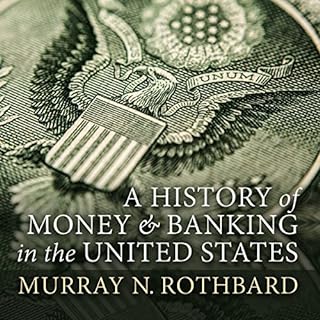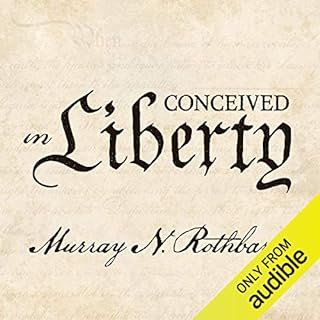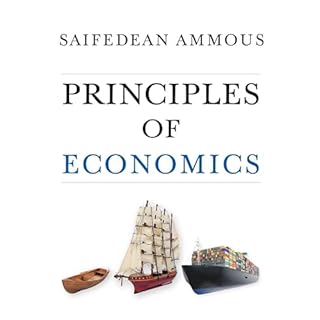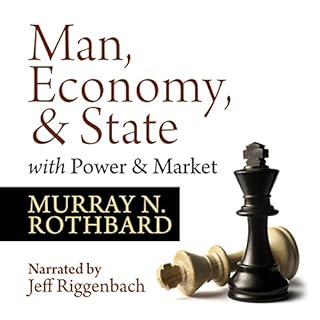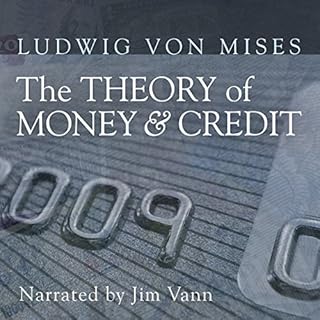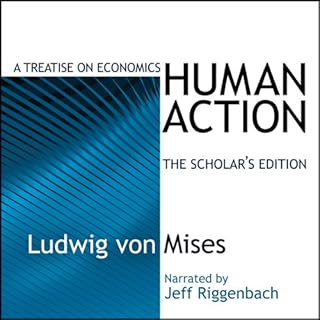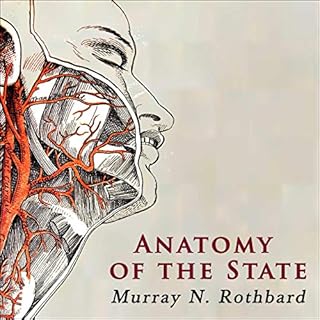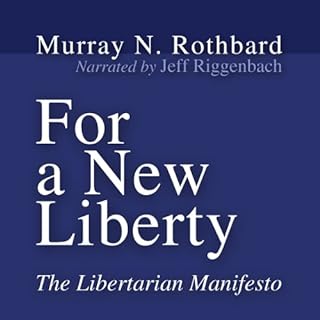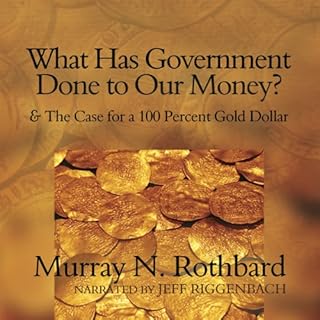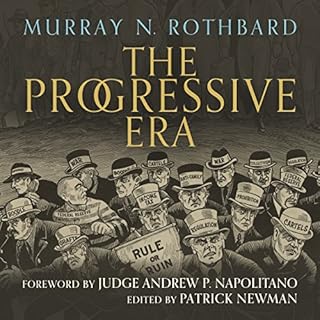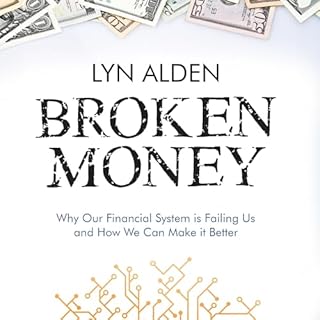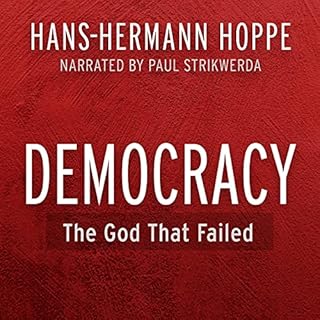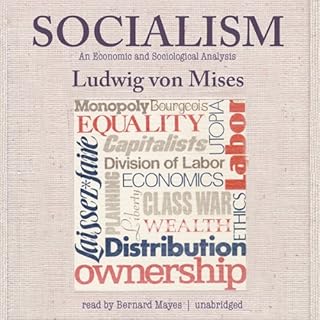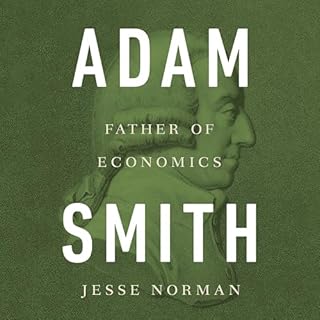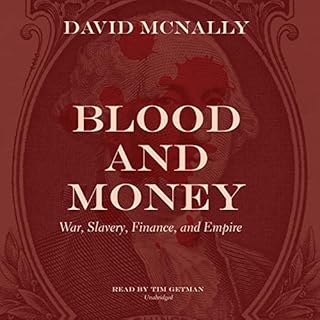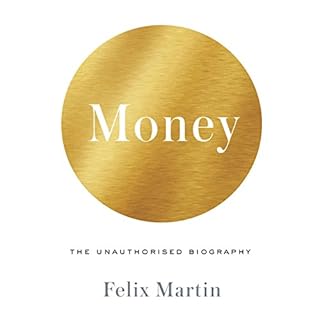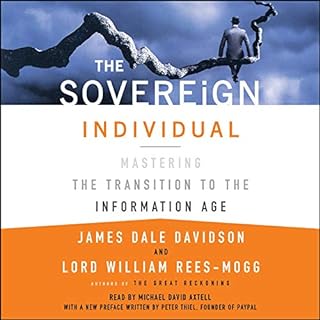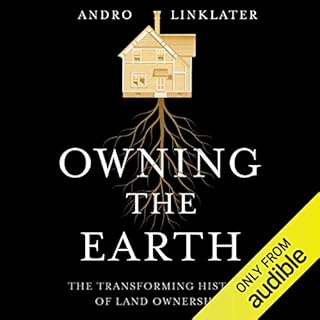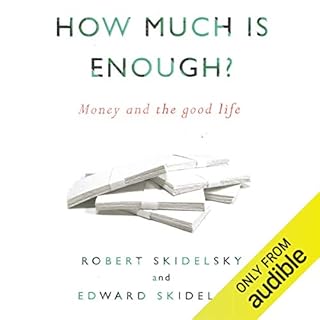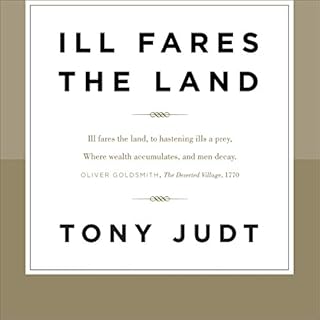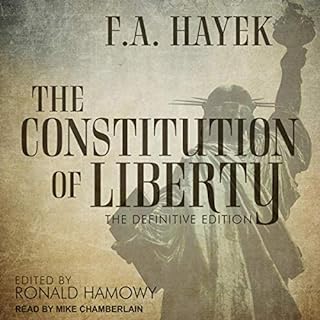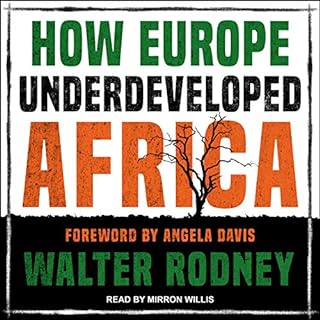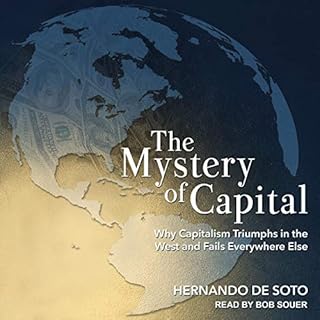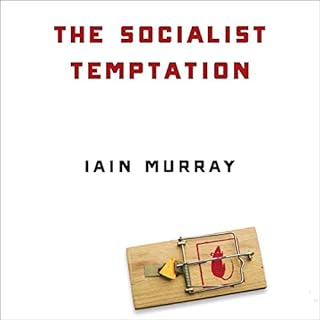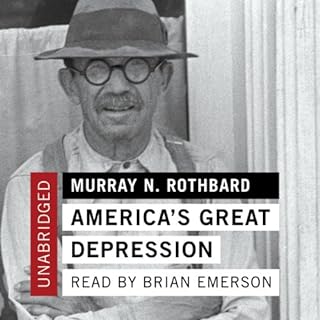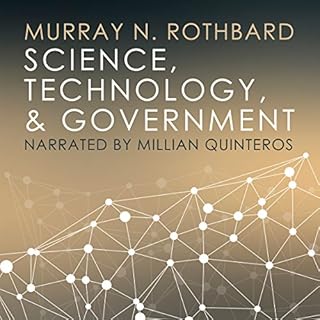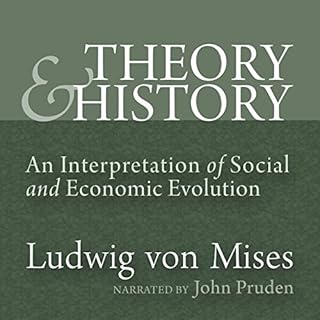-
An Austrian Perspective on the History of Economic Thought
- Narrado por: Jeff Riggenbach
- Duración: 55 h y 29 m
No se pudo agregar al carrito
Add to Cart failed.
Error al Agregar a Lista de Deseos.
Error al eliminar de la lista de deseos.
Error al añadir a tu biblioteca
Error al seguir el podcast
Error al dejar de seguir el podcast
 Exclusivo para miembros Prime: ¿Nuevo en Audible? Obtén 2 audiolibros gratis con tu prueba.
Exclusivo para miembros Prime: ¿Nuevo en Audible? Obtén 2 audiolibros gratis con tu prueba.Compra ahora por $29.95
No default payment method selected.
We are sorry. We are not allowed to sell this product with the selected payment method
Resumen del Editor
The appearance of the famous (and massive) volumes of Rothbard's Austrian Perspective on the History of Economic Thought in a new edition is cause for great celebration. They have been out of print for many years. They are at last accessible again, in a single book edition.
These are indeed the books that Mises himself longed to see. "A real history of economic thought," he said in 1955, "would have to point out the development of the doctrines and not merely list every book."
When these volumes first appeared, they were celebrated in Barron's and by top scholars around the world. They succeeded in changing the way people think about economic doctrine: the beginnings (not Adam Smith, but the Spanish theologians), the dead ends (Marx), the great triumphs (Bastiat, for example), and the truly great minds (Turgot and many others he rescued from near obscurity).
Rothbard read deeply in thinkers dating back hundreds and thousands of years, and spotted every promising line of thought — and every unfortunate one. He knew when an idea would lead to prosperity, and when it would lead to calamity. He could spot a proto-Keynesian or proto-Marxist idea in the Middle Ages, just as he could find free-market lines of thought in ancient manuscripts.
The numbers of insights in these volumes are countless. Every paragraph bursts with intellectual energy and the author's fiery passion to tell the listener the remarkable story of economics. Many reviewers have remarked that Rothbard's accomplishment seems superhuman. He seems to have read everything. His originality is overwhelming. His passion for liberty and integrity in science is evident. His disdain toward those who sell out to the state is manifest as well.
This set is a monument to Rothbard's genius, a resource that will be valuable to intellectuals for generations, and a great read too!
Los oyentes también disfrutaron...
-
A History of Money and Banking in the United States: The Colonial Era to World War II
- De: Murray N. Rothbard
- Narrado por: Matthew Mezinskis
- Duración: 13 h y 48 m
- Versión completa
-
General4.5 out of 5 stars 183
-
Narración:4 out of 5 stars 164
-
Historia4.5 out of 5 stars 167
In what is sure to become the standard account, Rothbard traces inflations, banking panics, and money meltdowns from the colonial period through the mid-20th century to show how government's systematic war on sound money is the hidden force behind nearly all major economic calamities in American history. Never has the story of money and banking been told with such rhetorical power and theoretical vigor. You will treasure this volume.
-
5 out of 5 stars
-
Great facts (if selective); ideological rigidity
- De Philo en 02-04-16
-
Conceived in Liberty
- De: Murray N. Rothbard
- Narrado por: Floy Lilley
- Duración: 80 h y 21 m
- Versión completa
-
General4.5 out of 5 stars 86
-
Narración:4 out of 5 stars 72
-
Historia4.5 out of 5 stars 71
The new single-volume edition of Conceived in Liberty is here! After so many years of having to juggle four volumes, the Mises Institute has finally put it all together in a single book. This makes it easier to listen to and makes clearer just what a contribution this book is to the history of libertarian literature. There's never been a better time to remember the revolutionary and even libertarian roots of the American founding, and there's no better guide to what this means in the narrative of the colonial period than Murray Rothbard.
-
5 out of 5 stars
-
Learned more here than 4 yrs of college
- De Scott Archer en 05-02-16
-
Principles of Economics
- De: Saifedean Ammous
- Narrado por: Saifedean Ammous
- Duración: 12 h y 53 m
- Versión completa
-
General4.5 out of 5 stars 76
-
Narración:4.5 out of 5 stars 70
-
Historia4.5 out of 5 stars 70
Principles of Economics is a university-level textbook in economics that offers a clear and concise exploration of the most important economic concepts. This book is unapologetically Austrian in its approach. It tackles major economic concepts and topics independently, but in a logical sequence aimed at delivering the listener an understanding of economics at an individual and societal level, and the widespread implications of economics as a topic.
-
5 out of 5 stars
-
I was already a fan of the Austrian school
- De PublicName en 10-13-23
De: Saifedean Ammous
-
The Mystery of Banking
- De: Murray N. Rothbard
- Narrado por: Jim Vann
- Duración: 9 h y 26 m
- Versión completa
-
General4.5 out of 5 stars 85
-
Narración:4.5 out of 5 stars 74
-
Historia4.5 out of 5 stars 74
Talk about great timing. Rothbard's extraordinary book unravels the mystery of banking: What is legitimate enterprise and what is a government-backed shell game that can't last? His explanation is clear enough for anyone to follow and yet precise and rigorous enough to be the best textbook for college classes on the topic. This is because its expository clarity - in its history and theory - is essentially unrivaled. Most notably, he uses the T-account method of explaining the relationship between deposits and loans, showing the inherent instability of fractional reserve banking.
-
3 out of 5 stars
-
Completely incompetent narrator
- De Lisa en 01-24-19
-
Barbarians Inside the Gates and Other Controversial Essays
- De: Thomas Sowell
- Narrado por: Leon Nixon
- Duración: 8 h y 40 m
- Versión completa
-
General5 out of 5 stars 81
-
Narración:5 out of 5 stars 74
-
Historia5 out of 5 stars 74
A collection of essays that discusses such issues as the media, immigration, the minimum wage, and multiculturalism.
-
5 out of 5 stars
-
Mr. Sowell exposed the soul of America.
- De ruth S. en 11-24-23
De: Thomas Sowell
-
Man, Economy, and State with Power and Market - Scholar's Edition
- De: Murray N. Rothbard
- Narrado por: Jeff Riggenbach
- Duración: 57 h y 48 m
- Versión completa
-
General5 out of 5 stars 165
-
Narración:4.5 out of 5 stars 143
-
Historia5 out of 5 stars 141
Murray N. Rothbard's great treatise, Man, Economy, and State, and its complementary text, Power and Market, are here combined into a single audiobook edition as they were written to be. It provides a sweeping presentation of Austrian economic theory, a reconstruction of many aspects of that theory, a rigorous criticism of alternative schools, and an inspiring look at a science of liberty that concerns nearly everything and should concern everyone.
-
5 out of 5 stars
-
Austrian Economics
- De Greek Samiotis en 04-13-16
-
A History of Money and Banking in the United States: The Colonial Era to World War II
- De: Murray N. Rothbard
- Narrado por: Matthew Mezinskis
- Duración: 13 h y 48 m
- Versión completa
-
General4.5 out of 5 stars 183
-
Narración:4 out of 5 stars 164
-
Historia4.5 out of 5 stars 167
In what is sure to become the standard account, Rothbard traces inflations, banking panics, and money meltdowns from the colonial period through the mid-20th century to show how government's systematic war on sound money is the hidden force behind nearly all major economic calamities in American history. Never has the story of money and banking been told with such rhetorical power and theoretical vigor. You will treasure this volume.
-
5 out of 5 stars
-
Great facts (if selective); ideological rigidity
- De Philo en 02-04-16
-
Conceived in Liberty
- De: Murray N. Rothbard
- Narrado por: Floy Lilley
- Duración: 80 h y 21 m
- Versión completa
-
General4.5 out of 5 stars 86
-
Narración:4 out of 5 stars 72
-
Historia4.5 out of 5 stars 71
The new single-volume edition of Conceived in Liberty is here! After so many years of having to juggle four volumes, the Mises Institute has finally put it all together in a single book. This makes it easier to listen to and makes clearer just what a contribution this book is to the history of libertarian literature. There's never been a better time to remember the revolutionary and even libertarian roots of the American founding, and there's no better guide to what this means in the narrative of the colonial period than Murray Rothbard.
-
5 out of 5 stars
-
Learned more here than 4 yrs of college
- De Scott Archer en 05-02-16
-
Principles of Economics
- De: Saifedean Ammous
- Narrado por: Saifedean Ammous
- Duración: 12 h y 53 m
- Versión completa
-
General4.5 out of 5 stars 76
-
Narración:4.5 out of 5 stars 70
-
Historia4.5 out of 5 stars 70
Principles of Economics is a university-level textbook in economics that offers a clear and concise exploration of the most important economic concepts. This book is unapologetically Austrian in its approach. It tackles major economic concepts and topics independently, but in a logical sequence aimed at delivering the listener an understanding of economics at an individual and societal level, and the widespread implications of economics as a topic.
-
5 out of 5 stars
-
I was already a fan of the Austrian school
- De PublicName en 10-13-23
De: Saifedean Ammous
-
The Mystery of Banking
- De: Murray N. Rothbard
- Narrado por: Jim Vann
- Duración: 9 h y 26 m
- Versión completa
-
General4.5 out of 5 stars 85
-
Narración:4.5 out of 5 stars 74
-
Historia4.5 out of 5 stars 74
Talk about great timing. Rothbard's extraordinary book unravels the mystery of banking: What is legitimate enterprise and what is a government-backed shell game that can't last? His explanation is clear enough for anyone to follow and yet precise and rigorous enough to be the best textbook for college classes on the topic. This is because its expository clarity - in its history and theory - is essentially unrivaled. Most notably, he uses the T-account method of explaining the relationship between deposits and loans, showing the inherent instability of fractional reserve banking.
-
3 out of 5 stars
-
Completely incompetent narrator
- De Lisa en 01-24-19
-
Barbarians Inside the Gates and Other Controversial Essays
- De: Thomas Sowell
- Narrado por: Leon Nixon
- Duración: 8 h y 40 m
- Versión completa
-
General5 out of 5 stars 81
-
Narración:5 out of 5 stars 74
-
Historia5 out of 5 stars 74
A collection of essays that discusses such issues as the media, immigration, the minimum wage, and multiculturalism.
-
5 out of 5 stars
-
Mr. Sowell exposed the soul of America.
- De ruth S. en 11-24-23
De: Thomas Sowell
-
Man, Economy, and State with Power and Market - Scholar's Edition
- De: Murray N. Rothbard
- Narrado por: Jeff Riggenbach
- Duración: 57 h y 48 m
- Versión completa
-
General5 out of 5 stars 165
-
Narración:4.5 out of 5 stars 143
-
Historia5 out of 5 stars 141
Murray N. Rothbard's great treatise, Man, Economy, and State, and its complementary text, Power and Market, are here combined into a single audiobook edition as they were written to be. It provides a sweeping presentation of Austrian economic theory, a reconstruction of many aspects of that theory, a rigorous criticism of alternative schools, and an inspiring look at a science of liberty that concerns nearly everything and should concern everyone.
-
5 out of 5 stars
-
Austrian Economics
- De Greek Samiotis en 04-13-16
-
The Theory of Money and Credit
- De: Ludwig von Mises
- Narrado por: Jim Vann
- Duración: 18 h y 59 m
- Versión completa
-
General4.5 out of 5 stars 59
-
Narración:4.5 out of 5 stars 50
-
Historia4.5 out of 5 stars 50
Mises wrote this book for the ages, and it remains the most spirited, thorough, and scientifically rigorous treatise on money ever to appear. This classic treatise was the first really great integration of microeconomics and macroeconomics, and it remains the definitive book on the foundations of monetary theory. As Rothbard points out in his introduction to "the best book on money ever written," economists have yet to absorb all its lessons.
-
5 out of 5 stars
-
Interesting read
- De Todd Woollen en 07-20-19
De: Ludwig von Mises
-
Human Action
- A Treatise on Economics
- De: Ludwig von Mises
- Narrado por: Jeff Riggenbach
- Duración: 47 h y 44 m
- Versión completa
-
General4.5 out of 5 stars 373
-
Narración:4.5 out of 5 stars 313
-
Historia4.5 out of 5 stars 310
Human Action is the most important book on political economy you will ever own. It was (and remains) the most comprehensive, systematic, forthright, and powerful defense of the economics of liberty ever written. This is the Scholar's Edition: accept no substitute. You will treasure this volume. The Scholar's Edition is the original, unaltered treatise (originally published in 1949) that shaped a generation of Austrians and made possible the intellectual movement that is leading the global charge for free markets.
-
5 out of 5 stars
-
Better be prepared to bookmark
- De Zephyr en 07-15-14
De: Ludwig von Mises
-
The Anatomy of the State (LvMI)
- De: Murray N. Rothbard
- Narrado por: John Riddle
- Duración: 57 m
- Versión completa
-
General4.5 out of 5 stars 558
-
Narración:4 out of 5 stars 468
-
Historia4.5 out of 5 stars 461
Murray Rothbard was known as the state's greatest living enemy, and this audiobook is his most powerful statement on the topic. He explains what a state is and what it is not. He shows how it is an institution that violates all that we hold as honest and moral, and how it operates under a false cover.
-
3 out of 5 stars
-
Good material
- De Tom en 12-14-19
-
For a New Liberty
- The Libertarian Manifesto
- De: Murray N. Rothbard
- Narrado por: Jeff Riggenbach
- Duración: 15 h y 38 m
- Versión completa
-
General4.5 out of 5 stars 617
-
Narración:4.5 out of 5 stars 550
-
Historia4.5 out of 5 stars 541
In For a New Liberty: The Libertarian Manifesto, Rothbard proposes a once-and-for-all escape from the two major political parties, the ideologies they embrace, and their central plans for using state power against people. Libertarianism is Rothbard's radical alternative that says state power is unworkable and immoral, and ought to be curbed and finally overthrown.
-
5 out of 5 stars
-
I'm a Ron Paul Libertarian but this is a good
- De monte reed en 03-20-12
-
What Has Government Done to Our Money?
- and The Case for a 100 Percent Gold Dollar
- De: Murray N. Rothbard
- Narrado por: Jeff Riggenbach
- Duración: 5 h y 12 m
- Versión completa
-
General4.5 out of 5 stars 340
-
Narración:4.5 out of 5 stars 297
-
Historia4.5 out of 5 stars 296
The Mises Institute is pleased to present this audio edition of Rothbard's most famous monetary essay - the one that has influenced two generations of economists, investors, and business professionals. The Mises Institute has united this book with its natural complement: a detailed reform proposal for a 100 percent gold dollar. "The Case for a 100 Percent Gold Dollar" was written a decade before the last vestiges of the gold standard were abolished.
-
5 out of 5 stars
-
Excellent!
- De James en 01-08-20
-
The Betrayal of the American Right
- De: Murray N. Rothbard
- Narrado por: Ian Temple
- Duración: 7 h y 3 m
- Versión completa
-
General4.5 out of 5 stars 7
-
Narración:4.5 out of 5 stars 7
-
Historia4.5 out of 5 stars 7
This remarkable piece of history will change the way you look at American politics. It shows that the corruption of American "conservatism" began long before George W. Bush ballooned the budget and asserted dictatorial rights over the country and the world. The American Right long ago slid into the abyss. Betrayal of the American Right is the story, and the author none other than Murray N. Rothbard, who witnessed it all firsthand. He tells his own story and reveals the machinations behind the subversion of an anti-state movement into one that cheers statism of the worst sort.
-
The Progressive Era
- De: Murray N. Rothbard
- Narrado por: Graham Wright
- Duración: 24 h y 10 m
- Versión completa
-
General4.5 out of 5 stars 123
-
Narración:4.5 out of 5 stars 107
-
Historia4.5 out of 5 stars 106
Rothbard's posthumous masterpiece is the definitive book on the Progressives. It will soon be the must read study of this dreadful time in our past. (from the foreword by Judge Andrew P. Napolitano) The current relationship between the modern state and the economy has its roots in the Progressive Era. (from the introduction by Patrick Newman) In short, the Progressive Era ushered the modern American politico-economic system into being. (from the preface by Murray N. Rothbard)
-
5 out of 5 stars
-
Details... Oh my God, the details
- De Russell Herbst en 05-25-18
-
Broken Money
- Why Our Financial System Is Failing Us and How We Can Make It Better
- De: Lyn Alden
- Narrado por: Guy Swann
- Duración: 17 h y 31 m
- Versión completa
-
General5 out of 5 stars 412
-
Narración:4.5 out of 5 stars 372
-
Historia5 out of 5 stars 372
Broken Money explores the history of money through the lens of technology. Politics can affect things temporarily and locally, but technology is what drives things forward globally and permanently. The book's goal is for the listener to walk away with a deep understanding of money and monetary history, both in terms of theoretical foundations and in terms of practical implications.
-
3 out of 5 stars
-
Turns into an advertisement for Bitcoin
- De Dan B en 04-23-24
De: Lyn Alden
-
Democracy: The God That Failed
- The Economics and Politics of Monarchy, Democracy and Natural Order (Perspectives on Democratic Practice)
- De: Hans-Hermann Hoppe
- Narrado por: Paul Strikwerda
- Duración: 12 h y 23 m
- Versión completa
-
General4.5 out of 5 stars 257
-
Narración:4.5 out of 5 stars 220
-
Historia4.5 out of 5 stars 220
This sweeping book is a systematic treatment of the historic transformation of the West from limited monarchy to unlimited democracy. Revisionist in nature, it reaches the conclusion that monarchy, with all its failings, is a lesser evil than mass democracy but outlines deficiencies in both as systems of guarding liberty.
-
4 out of 5 stars
-
Audiobook Chapter 11 is actually a repeat of Chapter 9
- De Anonymous User en 08-23-21
-
The Big Three in Economics
- Adam Smith, Karl Marx, and John Maynard Keynes
- De: Mark Skousen
- Narrado por: Jeff Riggenbach
- Duración: 9 h y 6 m
- Versión completa
-
General4 out of 5 stars 654
-
Narración:4.5 out of 5 stars 489
-
Historia4 out of 5 stars 489
The Big Three in Economics reveals the battle of ideas among the three most influential economists in world history: Adam Smith, representing laissez faire; Karl Marx, reflecting the radical socialist model; and John Maynard Keynes, symbolizing big government and the welfare state. History comes alive in this fascinating story of opposing views that continue to play a fundamental role in today's politics and economics.
-
3 out of 5 stars
-
Cut and paste
- De Jan en 05-25-07
De: Mark Skousen
-
Socialism
- An Economic and Sociological Analysis
- De: Ludwig von Mises
- Narrado por: Bernard Mayes
- Duración: 24 h y 7 m
- Versión completa
-
General4.5 out of 5 stars 224
-
Narración:4.5 out of 5 stars 189
-
Historia4.5 out of 5 stars 190
Published in 1922 during those dark and dreary years of socialism’s near-complete triumph, Socialism stunned the socialist world. Mises has given us a profoundly important treatise that assaults socialism in all its guises, a work that discusses every major aspect of socialism and leaves no stone unturned. A few of the numerous topics discussed include the success of socialist ideas; life under socialism: art and literature, science and journalism; economic calculation under socialism; the ideal of equality; and Marx’s theory of monopolies.
-
3 out of 5 stars
-
Unconvincing
- De bookscdsdvdsandcoolstuff en 01-03-15
De: Ludwig von Mises
-
The White Pill
- A Tale of Good and Evil
- De: Michael Malice
- Narrado por: Michael Malice
- Duración: 9 h y 11 m
- Versión completa
-
General5 out of 5 stars 850
-
Narración:4.5 out of 5 stars 777
-
Historia5 out of 5 stars 774
The Bolsheviks promised that they were building a new society, a workers’ paradise that would change the nature of mankind itself. What they ended up constructing was the largest prison the world had ever seen: a Union of Soviet Socialist Republics that spanned half the globe.
-
5 out of 5 stars
-
Do not buy the audio version.
- De Todd en 02-20-23
De: Michael Malice
Relacionado con este tema
-
Adam Smith
- Father of Economics
- De: Jesse Norman
- Narrado por: Jesse Norman
- Duración: 13 h y 40 m
- Versión completa
-
General4.5 out of 5 stars 55
-
Narración:4.5 out of 5 stars 48
-
Historia4.5 out of 5 stars 48
A dazzlingly original account of the life and thought of Adam Smith, the greatest economist of all time. In Adam Smith, political philosopher Jesse Norman dispels the myths and caricatures, and provides a far more complex portrait of the man. Offering a highly engaging account of Smith's life and times, Norman explores his work as a whole and traces his influence over two centuries to the present day. Finally, he shows how a proper understanding of Smith can help us address the problems of modern capitalism.
-
5 out of 5 stars
-
Most excellent book!
- De Harish G. Naik en 03-02-19
De: Jesse Norman
-
50 Economics Classics
- Your Shortcut to the Most Important Ideas on Capitalism, Finance, and the Global Economy
- De: Tom Butler-Bowdon
- Narrado por: John Chancer
- Duración: 15 h y 22 m
- Versión completa
-
General4.5 out of 5 stars 39
-
Narración:5 out of 5 stars 32
-
Historia5 out of 5 stars 32
Economics drives the modern world and shapes our lives, but few of us feel we have time to engage with the breadth of ideas in the subject. 50 Economics Classics is the smart person's guide to two centuries of discussion of finance, capitalism, and the global economy. From Adam Smith's Wealth of Nations to Thomas Piketty's best-seller Capital in the Twenty-First Century, here are the great books and seminal ideas, clarified and illuminated for all.
-
Blood and Money
- War, Slavery, Finance, and Empire
- De: David McNally
- Narrado por: Tim Getman
- Duración: 11 h y 59 m
- Versión completa
-
General4.5 out of 5 stars 37
-
Narración:4.5 out of 5 stars 36
-
Historia4.5 out of 5 stars 36
In most accounts of the origins of money, we are offered pleasant tales in which it arises to the mutual benefit of all parties as a result of barter. In this groundbreaking study David McNally reveals the true story of money's origins and development as one of violence and human bondage. Money's emergence and its transformation are shown to be intimately connected to the buying and selling of slaves and the waging of war.
-
4 out of 5 stars
-
Blood Money
- De Tyrone en 03-19-22
De: David McNally
-
Money
- The Unauthorized Biography
- De: Felix Martin
- Narrado por: Nicholas Guy Smith
- Duración: 12 h y 37 m
- Versión completa
-
General4.5 out of 5 stars 130
-
Narración:4.5 out of 5 stars 114
-
Historia4.5 out of 5 stars 112
From ancient currency to Adam Smith, from the gold standard to shadow banking and the Great Recession: a sweeping historical epic that traces the development and evolution of one of humankind’s greatest inventions.
-
2 out of 5 stars
-
Difficult to imagine how it could be worse
- De J. M. Batista en 09-19-17
De: Felix Martin
-
Bourgeois Equality
- How Ideas, Not Capital or Institutions, Enriched the World
- De: Deirdre N. McCloskey
- Narrado por: Marguerite Gavin
- Duración: 29 h y 38 m
- Versión completa
-
General5 out of 5 stars 41
-
Narración:4.5 out of 5 stars 35
-
Historia5 out of 5 stars 35
Few economists or historians write like McCloskey - her ability to invest the facts of economic history with the urgency of a novel, or of a leading case at law, is unmatched. She summarizes modern economics and modern economic history with verve and lucidity yet sees through to the really big scientific conclusion. Not matter, but ideas. Big books don't come any more ambitious or captivating than Bourgeois Equality.
-
5 out of 5 stars
-
How the world got rich
- De Andrew Cooper-Sansone en 01-26-23
-
The Great Degeneration
- How Institutions Decay and Economies Die
- De: Niall Ferguson
- Narrado por: Paul Slack
- Duración: 4 h y 18 m
- Versión completa
-
General4.5 out of 5 stars 307
-
Narración:4.5 out of 5 stars 260
-
Historia4.5 out of 5 stars 259
Best-selling author and world-renowned historian Niall Ferguson has won widespread acclaim for thought-provoking works such as Civilization and High Financier. The Great Degeneration tackles nothing less than the decline of Western civilization. Ferguson posits that slowing growth, outrageous debt, and antisocial behavior are contributing to the erosion of the West’s once rock-solid foundations. Ferguson excavates the causes and shows how heroic leadership and radical reform are needed to right the course.
-
5 out of 5 stars
-
Superb as always!
- De Ivanhoe en 08-28-17
De: Niall Ferguson
-
Adam Smith
- Father of Economics
- De: Jesse Norman
- Narrado por: Jesse Norman
- Duración: 13 h y 40 m
- Versión completa
-
General4.5 out of 5 stars 55
-
Narración:4.5 out of 5 stars 48
-
Historia4.5 out of 5 stars 48
A dazzlingly original account of the life and thought of Adam Smith, the greatest economist of all time. In Adam Smith, political philosopher Jesse Norman dispels the myths and caricatures, and provides a far more complex portrait of the man. Offering a highly engaging account of Smith's life and times, Norman explores his work as a whole and traces his influence over two centuries to the present day. Finally, he shows how a proper understanding of Smith can help us address the problems of modern capitalism.
-
5 out of 5 stars
-
Most excellent book!
- De Harish G. Naik en 03-02-19
De: Jesse Norman
-
50 Economics Classics
- Your Shortcut to the Most Important Ideas on Capitalism, Finance, and the Global Economy
- De: Tom Butler-Bowdon
- Narrado por: John Chancer
- Duración: 15 h y 22 m
- Versión completa
-
General4.5 out of 5 stars 39
-
Narración:5 out of 5 stars 32
-
Historia5 out of 5 stars 32
Economics drives the modern world and shapes our lives, but few of us feel we have time to engage with the breadth of ideas in the subject. 50 Economics Classics is the smart person's guide to two centuries of discussion of finance, capitalism, and the global economy. From Adam Smith's Wealth of Nations to Thomas Piketty's best-seller Capital in the Twenty-First Century, here are the great books and seminal ideas, clarified and illuminated for all.
-
Blood and Money
- War, Slavery, Finance, and Empire
- De: David McNally
- Narrado por: Tim Getman
- Duración: 11 h y 59 m
- Versión completa
-
General4.5 out of 5 stars 37
-
Narración:4.5 out of 5 stars 36
-
Historia4.5 out of 5 stars 36
In most accounts of the origins of money, we are offered pleasant tales in which it arises to the mutual benefit of all parties as a result of barter. In this groundbreaking study David McNally reveals the true story of money's origins and development as one of violence and human bondage. Money's emergence and its transformation are shown to be intimately connected to the buying and selling of slaves and the waging of war.
-
4 out of 5 stars
-
Blood Money
- De Tyrone en 03-19-22
De: David McNally
-
Money
- The Unauthorized Biography
- De: Felix Martin
- Narrado por: Nicholas Guy Smith
- Duración: 12 h y 37 m
- Versión completa
-
General4.5 out of 5 stars 130
-
Narración:4.5 out of 5 stars 114
-
Historia4.5 out of 5 stars 112
From ancient currency to Adam Smith, from the gold standard to shadow banking and the Great Recession: a sweeping historical epic that traces the development and evolution of one of humankind’s greatest inventions.
-
2 out of 5 stars
-
Difficult to imagine how it could be worse
- De J. M. Batista en 09-19-17
De: Felix Martin
-
Bourgeois Equality
- How Ideas, Not Capital or Institutions, Enriched the World
- De: Deirdre N. McCloskey
- Narrado por: Marguerite Gavin
- Duración: 29 h y 38 m
- Versión completa
-
General5 out of 5 stars 41
-
Narración:4.5 out of 5 stars 35
-
Historia5 out of 5 stars 35
Few economists or historians write like McCloskey - her ability to invest the facts of economic history with the urgency of a novel, or of a leading case at law, is unmatched. She summarizes modern economics and modern economic history with verve and lucidity yet sees through to the really big scientific conclusion. Not matter, but ideas. Big books don't come any more ambitious or captivating than Bourgeois Equality.
-
5 out of 5 stars
-
How the world got rich
- De Andrew Cooper-Sansone en 01-26-23
-
The Great Degeneration
- How Institutions Decay and Economies Die
- De: Niall Ferguson
- Narrado por: Paul Slack
- Duración: 4 h y 18 m
- Versión completa
-
General4.5 out of 5 stars 307
-
Narración:4.5 out of 5 stars 260
-
Historia4.5 out of 5 stars 259
Best-selling author and world-renowned historian Niall Ferguson has won widespread acclaim for thought-provoking works such as Civilization and High Financier. The Great Degeneration tackles nothing less than the decline of Western civilization. Ferguson posits that slowing growth, outrageous debt, and antisocial behavior are contributing to the erosion of the West’s once rock-solid foundations. Ferguson excavates the causes and shows how heroic leadership and radical reform are needed to right the course.
-
5 out of 5 stars
-
Superb as always!
- De Ivanhoe en 08-28-17
De: Niall Ferguson
-
The Sovereign Individual
- Mastering the Transition to the Information Age
- De: James Dale Davidson, Peter Thiel - preface, William Rees-Mogg
- Narrado por: Michael David Axtell
- Duración: 19 h y 20 m
- Versión completa
-
General4.5 out of 5 stars 1,395
-
Narración:5 out of 5 stars 1,124
-
Historia4.5 out of 5 stars 1,119
Two renowned investment advisors and authors of the best seller The Great Reckoning bring to light both currents of disaster and the potential for prosperity and renewal in the face of radical changes in human history as we move into the next century. The Sovereign Individual details strategies necessary for adapting financially to the next phase of Western civilization.
-
3 out of 5 stars
-
Unfortunately distopian for mosty of humanity
- De Phil en 09-29-20
De: James Dale Davidson, y otros
-
The Victory of Reason
- How Christianity Led to Freedom, Capitalism, and Western Success
- De: Rodney Stark
- Narrado por: Bob Souer
- Duración: 8 h y 3 m
- Versión completa
-
General5 out of 5 stars 105
-
Narración:4.5 out of 5 stars 94
-
Historia5 out of 5 stars 94
In The Victory of Reason, Rodney Stark advances a revolutionary, controversial, and long overdue idea: that Christianity and its related institutions are, in fact, directly responsible for the most significant intellectual, political, scientific, and economic breakthroughs of the past millennium. In Stark's view, what has propelled the West is not the tension between secular and non-secular society, nor the pitting of science and the humanities against religious belief. Christian theology, Stark asserts, is the very font of reason.
-
5 out of 5 stars
-
Absolutely incredible history book!
- De Daniel en 01-02-20
De: Rodney Stark
-
Owning the Earth
- The Transforming History of Land Ownership
- De: Andro Linklater
- Narrado por: J. Paul Guimont
- Duración: 17 h y 9 m
- Versión completa
-
General4.5 out of 5 stars 38
-
Narración:4.5 out of 5 stars 29
-
Historia4.5 out of 5 stars 30
The history and evolution of land ownership is a fascinating chronicle in the history of civilization, offering unexpected insights about how various forms of democracy and capitalism developed, as well as a revealing analysis of a future where the Earth must sustain nine billion lives. Seen through the eyes of remarkable individuals - Chinese emperors; German peasants; the 17th century English surveyor William Petty, who first saw the connection between private property and free-market capitalism.
-
5 out of 5 stars
-
Interesting
- De S. Olsen en 06-30-15
De: Andro Linklater
-
The Austrian School of Economics
- A History of Its Ideas, Ambassadors, & Institutions
- De: Eugen Maria Schulak, Herbert Unterköfler
- Narrado por: Paul Strikwerda
- Duración: 6 h y 35 m
- Versión completa
-
General4 out of 5 stars 73
-
Narración:4 out of 5 stars 62
-
Historia4 out of 5 stars 59
The Austrian School is in the news as never before. It is discussed on business pages, in academic journals, and in speeches by public figures. At long last, there is a brilliant and engaging guide to the history, ideas, and institutions of the Austrian School of economics. It is written by two Austrian intellectuals who have gone to the sources themselves to provide a completely new look at the tradition and what it means for the future.
-
5 out of 5 stars
-
Good book about Austrian Economics and it's histor
- De Kyle and Dawn Christerson en 04-30-19
De: Eugen Maria Schulak, y otros
-
How Much is Enough?
- Money and the Good Life
- De: Edward Skidelsky
- Narrado por: Clay Teunis
- Duración: 8 h y 53 m
- Versión completa
-
General4 out of 5 stars 50
-
Narración:4.5 out of 5 stars 38
-
Historia4 out of 5 stars 38
What constitutes the good life? What is the true value of money? Why do we work such long hours merely to acquire greater wealth? These are some of the questions that many asked themselves when the financial system crashed in 2008. This book tackles such questions head-on.The authors begin with the great economist John Maynard Keynes. In 1930 Keynes predicted that, within a century, per capita income would steadily rise, people’s basic needs would be met, and no one would have to work more than fifteen hours a week.
-
2 out of 5 stars
-
Not what I expected at all!
- De Chi en 05-22-23
De: Edward Skidelsky
-
Ill Fares the Land
- De: Tony Judt
- Narrado por: James Adams
- Duración: 5 h y 40 m
- Versión completa
-
General4.5 out of 5 stars 121
-
Narración:4.5 out of 5 stars 91
-
Historia4.5 out of 5 stars 92
In Ill Fares The Land, Tony Judt, one of our leading historians and thinkers, reveals how we have arrived at our present dangerously confused moment. Judt masterfully crystallizes what we've all been feeling into a way to think our way into, and thus out of, our great collective dis-ease about the current state of things.
-
4 out of 5 stars
-
Blah, Blah, Blah.
- De Michael en 07-15-10
De: Tony Judt
-
For a New Liberty
- The Libertarian Manifesto
- De: Murray N. Rothbard
- Narrado por: Jeff Riggenbach
- Duración: 15 h y 38 m
- Versión completa
-
General4.5 out of 5 stars 617
-
Narración:4.5 out of 5 stars 550
-
Historia4.5 out of 5 stars 541
In For a New Liberty: The Libertarian Manifesto, Rothbard proposes a once-and-for-all escape from the two major political parties, the ideologies they embrace, and their central plans for using state power against people. Libertarianism is Rothbard's radical alternative that says state power is unworkable and immoral, and ought to be curbed and finally overthrown.
-
5 out of 5 stars
-
I'm a Ron Paul Libertarian but this is a good
- De monte reed en 03-20-12
-
The Constitution of Liberty
- The Definitive Edition
- De: Ronald Hamowy - Edited by, F. A. Hayek
- Narrado por: Mike Chamberlain
- Duración: 20 h y 7 m
- Versión completa
-
General5 out of 5 stars 115
-
Narración:4.5 out of 5 stars 102
-
Historia5 out of 5 stars 101
The Constitution of Liberty is considered Hayek's classic statement on the ideals of freedom and liberty, ideals that he believes have guided - and must continue to guide - the growth of Western civilization. Here, Hayek defends the principles of a free society, casting a skeptical eye on the growth of the welfare state and examining the challenges to freedom posed by an ever-expanding government.
-
5 out of 5 stars
-
very detailed and important
- De Big Kyle 570 en 06-17-20
De: Ronald Hamowy - Edited by, y otros
-
How Europe Underdeveloped Africa
- De: Walter Rodney, Angela Y. Davis - foreword
- Narrado por: Mirron Willis
- Duración: 13 h y 21 m
- Versión completa
-
General5 out of 5 stars 548
-
Narración:4.5 out of 5 stars 465
-
Historia5 out of 5 stars 456
Guyanese intellectual Walter Rodney emerged as one of the leading thinkers and activists of the anticolonial revolution. In 1980, shortly after founding of the Working People's Alliance in Guyana, the 38-year-old Rodney would be assassinated. In his magnum opus, Rodney incisively argues that grasping "the great divergence" between the West and the rest can only be explained as the exploitation of the latter by the former. This meticulously researched analysis of the repercussions of European colonialism in Africa remains an indispensable study for grasping global inequality today.
-
4 out of 5 stars
-
A Superb must read for everyone
- De Joy en 04-16-19
De: Walter Rodney, y otros
-
Liberty Lost: American Big Government and the Erosion of the U.S. Constitution
- A Brief History
- De: Michael Dahlen
- Narrado por: Joe Nagle
- Duración: 1 h y 23 m
- Versión completa
-
General4.5 out of 5 stars 23
-
Narración:4.5 out of 5 stars 22
-
Historia4.5 out of 5 stars 22
Nineteenth-century America was the closest thing to pure free-market capitalism that has ever existed. There was no welfare state, no central bank, no deficit spending to speak of, no fiat money, and no income tax for most of the century, and no antitrust laws or federal regulatory agencies until the end of the century. During the 20th century, by contrast, American liberty declined as the size, scope, and power of government exploded. Federal spending, taxes, deficits, and debt have spiraled out of control.
-
5 out of 5 stars
-
US political/economic evolution explained
- De Jannie Meisberger en 06-25-16
De: Michael Dahlen
-
The Mystery of Capital
- Why Capitalism Triumphs in the West and Fails Everywhere Else
- De: Hernando de Soto
- Narrado por: Bob Souer
- Duración: 6 h y 52 m
- Versión completa
-
General4.5 out of 5 stars 151
-
Narración:4.5 out of 5 stars 132
-
Historia5 out of 5 stars 130
"The hour of capitalism's greatest triumph," writes Hernando de Soto, "is, in the eyes of four-fifths of humanity, its hour of crisis." In The Mystery of Capital, the world-famous Peruvian economist takes up one of the most pressing questions the world faces today: Why do some countries succeed at capitalism while others fail?
-
5 out of 5 stars
-
Good global perspective on Capitalism
- De Nellie boi en 05-29-21
De: Hernando de Soto
-
The Socialist Temptation
- De: Iain Murray
- Narrado por: James Langton
- Duración: 6 h y 13 m
- Versión completa
-
General5 out of 5 stars 22
-
Narración:5 out of 5 stars 20
-
Historia5 out of 5 stars 20
Just 30 years ago, socialism seemed utterly discredited. An economic, moral, and political failure, socialism had rightly been thrown on the ash heap of history after the fall of the Berlin Wall. Unfortunately, bad ideas never truly go away — and socialism has come back with a vengeance. A generation of young people who don’t remember the misery that socialism inflicted on Russia and Eastern Europe is embracing it all over again.
-
5 out of 5 stars
-
Full Of Important Insights
- De Ralph Alderson en 12-17-20
De: Iain Murray
Las personas que vieron esto también vieron...
-
Conceived in Liberty
- De: Murray N. Rothbard
- Narrado por: Floy Lilley
- Duración: 80 h y 21 m
- Versión completa
-
General4.5 out of 5 stars 86
-
Narración:4 out of 5 stars 72
-
Historia4.5 out of 5 stars 71
The new single-volume edition of Conceived in Liberty is here! After so many years of having to juggle four volumes, the Mises Institute has finally put it all together in a single book. This makes it easier to listen to and makes clearer just what a contribution this book is to the history of libertarian literature. There's never been a better time to remember the revolutionary and even libertarian roots of the American founding, and there's no better guide to what this means in the narrative of the colonial period than Murray Rothbard.
-
5 out of 5 stars
-
Learned more here than 4 yrs of college
- De Scott Archer en 05-02-16
-
A History of Money and Banking in the United States: The Colonial Era to World War II
- De: Murray N. Rothbard
- Narrado por: Matthew Mezinskis
- Duración: 13 h y 48 m
- Versión completa
-
General4.5 out of 5 stars 183
-
Narración:4 out of 5 stars 164
-
Historia4.5 out of 5 stars 167
In what is sure to become the standard account, Rothbard traces inflations, banking panics, and money meltdowns from the colonial period through the mid-20th century to show how government's systematic war on sound money is the hidden force behind nearly all major economic calamities in American history. Never has the story of money and banking been told with such rhetorical power and theoretical vigor. You will treasure this volume.
-
5 out of 5 stars
-
Great facts (if selective); ideological rigidity
- De Philo en 02-04-16
-
Man, Economy, and State with Power and Market - Scholar's Edition
- De: Murray N. Rothbard
- Narrado por: Jeff Riggenbach
- Duración: 57 h y 48 m
- Versión completa
-
General5 out of 5 stars 165
-
Narración:4.5 out of 5 stars 143
-
Historia5 out of 5 stars 141
Murray N. Rothbard's great treatise, Man, Economy, and State, and its complementary text, Power and Market, are here combined into a single audiobook edition as they were written to be. It provides a sweeping presentation of Austrian economic theory, a reconstruction of many aspects of that theory, a rigorous criticism of alternative schools, and an inspiring look at a science of liberty that concerns nearly everything and should concern everyone.
-
5 out of 5 stars
-
Austrian Economics
- De Greek Samiotis en 04-13-16
-
The Anatomy of the State (LvMI)
- De: Murray N. Rothbard
- Narrado por: John Riddle
- Duración: 57 m
- Versión completa
-
General4.5 out of 5 stars 558
-
Narración:4 out of 5 stars 468
-
Historia4.5 out of 5 stars 461
Murray Rothbard was known as the state's greatest living enemy, and this audiobook is his most powerful statement on the topic. He explains what a state is and what it is not. He shows how it is an institution that violates all that we hold as honest and moral, and how it operates under a false cover.
-
3 out of 5 stars
-
Good material
- De Tom en 12-14-19
-
The Theory of Money and Credit
- De: Ludwig von Mises
- Narrado por: Jim Vann
- Duración: 18 h y 59 m
- Versión completa
-
General4.5 out of 5 stars 59
-
Narración:4.5 out of 5 stars 50
-
Historia4.5 out of 5 stars 50
Mises wrote this book for the ages, and it remains the most spirited, thorough, and scientifically rigorous treatise on money ever to appear. This classic treatise was the first really great integration of microeconomics and macroeconomics, and it remains the definitive book on the foundations of monetary theory. As Rothbard points out in his introduction to "the best book on money ever written," economists have yet to absorb all its lessons.
-
5 out of 5 stars
-
Interesting read
- De Todd Woollen en 07-20-19
De: Ludwig von Mises
-
The Austrian School of Economics
- A History of Its Ideas, Ambassadors, & Institutions
- De: Eugen Maria Schulak, Herbert Unterköfler
- Narrado por: Paul Strikwerda
- Duración: 6 h y 35 m
- Versión completa
-
General4 out of 5 stars 73
-
Narración:4 out of 5 stars 62
-
Historia4 out of 5 stars 59
The Austrian School is in the news as never before. It is discussed on business pages, in academic journals, and in speeches by public figures. At long last, there is a brilliant and engaging guide to the history, ideas, and institutions of the Austrian School of economics. It is written by two Austrian intellectuals who have gone to the sources themselves to provide a completely new look at the tradition and what it means for the future.
-
5 out of 5 stars
-
Good book about Austrian Economics and it's histor
- De Kyle and Dawn Christerson en 04-30-19
De: Eugen Maria Schulak, y otros
-
Conceived in Liberty
- De: Murray N. Rothbard
- Narrado por: Floy Lilley
- Duración: 80 h y 21 m
- Versión completa
-
General4.5 out of 5 stars 86
-
Narración:4 out of 5 stars 72
-
Historia4.5 out of 5 stars 71
The new single-volume edition of Conceived in Liberty is here! After so many years of having to juggle four volumes, the Mises Institute has finally put it all together in a single book. This makes it easier to listen to and makes clearer just what a contribution this book is to the history of libertarian literature. There's never been a better time to remember the revolutionary and even libertarian roots of the American founding, and there's no better guide to what this means in the narrative of the colonial period than Murray Rothbard.
-
5 out of 5 stars
-
Learned more here than 4 yrs of college
- De Scott Archer en 05-02-16
-
A History of Money and Banking in the United States: The Colonial Era to World War II
- De: Murray N. Rothbard
- Narrado por: Matthew Mezinskis
- Duración: 13 h y 48 m
- Versión completa
-
General4.5 out of 5 stars 183
-
Narración:4 out of 5 stars 164
-
Historia4.5 out of 5 stars 167
In what is sure to become the standard account, Rothbard traces inflations, banking panics, and money meltdowns from the colonial period through the mid-20th century to show how government's systematic war on sound money is the hidden force behind nearly all major economic calamities in American history. Never has the story of money and banking been told with such rhetorical power and theoretical vigor. You will treasure this volume.
-
5 out of 5 stars
-
Great facts (if selective); ideological rigidity
- De Philo en 02-04-16
-
Man, Economy, and State with Power and Market - Scholar's Edition
- De: Murray N. Rothbard
- Narrado por: Jeff Riggenbach
- Duración: 57 h y 48 m
- Versión completa
-
General5 out of 5 stars 165
-
Narración:4.5 out of 5 stars 143
-
Historia5 out of 5 stars 141
Murray N. Rothbard's great treatise, Man, Economy, and State, and its complementary text, Power and Market, are here combined into a single audiobook edition as they were written to be. It provides a sweeping presentation of Austrian economic theory, a reconstruction of many aspects of that theory, a rigorous criticism of alternative schools, and an inspiring look at a science of liberty that concerns nearly everything and should concern everyone.
-
5 out of 5 stars
-
Austrian Economics
- De Greek Samiotis en 04-13-16
-
The Anatomy of the State (LvMI)
- De: Murray N. Rothbard
- Narrado por: John Riddle
- Duración: 57 m
- Versión completa
-
General4.5 out of 5 stars 558
-
Narración:4 out of 5 stars 468
-
Historia4.5 out of 5 stars 461
Murray Rothbard was known as the state's greatest living enemy, and this audiobook is his most powerful statement on the topic. He explains what a state is and what it is not. He shows how it is an institution that violates all that we hold as honest and moral, and how it operates under a false cover.
-
3 out of 5 stars
-
Good material
- De Tom en 12-14-19
-
The Theory of Money and Credit
- De: Ludwig von Mises
- Narrado por: Jim Vann
- Duración: 18 h y 59 m
- Versión completa
-
General4.5 out of 5 stars 59
-
Narración:4.5 out of 5 stars 50
-
Historia4.5 out of 5 stars 50
Mises wrote this book for the ages, and it remains the most spirited, thorough, and scientifically rigorous treatise on money ever to appear. This classic treatise was the first really great integration of microeconomics and macroeconomics, and it remains the definitive book on the foundations of monetary theory. As Rothbard points out in his introduction to "the best book on money ever written," economists have yet to absorb all its lessons.
-
5 out of 5 stars
-
Interesting read
- De Todd Woollen en 07-20-19
De: Ludwig von Mises
-
The Austrian School of Economics
- A History of Its Ideas, Ambassadors, & Institutions
- De: Eugen Maria Schulak, Herbert Unterköfler
- Narrado por: Paul Strikwerda
- Duración: 6 h y 35 m
- Versión completa
-
General4 out of 5 stars 73
-
Narración:4 out of 5 stars 62
-
Historia4 out of 5 stars 59
The Austrian School is in the news as never before. It is discussed on business pages, in academic journals, and in speeches by public figures. At long last, there is a brilliant and engaging guide to the history, ideas, and institutions of the Austrian School of economics. It is written by two Austrian intellectuals who have gone to the sources themselves to provide a completely new look at the tradition and what it means for the future.
-
5 out of 5 stars
-
Good book about Austrian Economics and it's histor
- De Kyle and Dawn Christerson en 04-30-19
De: Eugen Maria Schulak, y otros
-
America's Great Depression
- De: Murray N. Rothbard
- Narrado por: Tom Weiner
- Duración: 10 h y 4 m
- Versión completa
-
General4.5 out of 5 stars 498
-
Narración:4.5 out of 5 stars 358
-
Historia4.5 out of 5 stars 361
The Great Depression was not a crisis for capitalism but merely an example of the downturn part of the business cycle, which was generated by government intervention in the economy. Had this book appeared in the 1940s, it might have spared the world much grief. Even so, its appearance in 1963 meant that free-market advocates had their first full-scale treatment of this crucial subject.
-
5 out of 5 stars
-
Outstanding historical analysis
- De James en 10-30-08
-
The Progressive Era
- De: Murray N. Rothbard
- Narrado por: Graham Wright
- Duración: 24 h y 10 m
- Versión completa
-
General4.5 out of 5 stars 123
-
Narración:4.5 out of 5 stars 107
-
Historia4.5 out of 5 stars 106
Rothbard's posthumous masterpiece is the definitive book on the Progressives. It will soon be the must read study of this dreadful time in our past. (from the foreword by Judge Andrew P. Napolitano) The current relationship between the modern state and the economy has its roots in the Progressive Era. (from the introduction by Patrick Newman) In short, the Progressive Era ushered the modern American politico-economic system into being. (from the preface by Murray N. Rothbard)
-
5 out of 5 stars
-
Details... Oh my God, the details
- De Russell Herbst en 05-25-18
-
What Has Government Done to Our Money?
- and The Case for a 100 Percent Gold Dollar
- De: Murray N. Rothbard
- Narrado por: Jeff Riggenbach
- Duración: 5 h y 12 m
- Versión completa
-
General4.5 out of 5 stars 340
-
Narración:4.5 out of 5 stars 297
-
Historia4.5 out of 5 stars 296
The Mises Institute is pleased to present this audio edition of Rothbard's most famous monetary essay - the one that has influenced two generations of economists, investors, and business professionals. The Mises Institute has united this book with its natural complement: a detailed reform proposal for a 100 percent gold dollar. "The Case for a 100 Percent Gold Dollar" was written a decade before the last vestiges of the gold standard were abolished.
-
5 out of 5 stars
-
Excellent!
- De James en 01-08-20
-
Human Action
- A Treatise on Economics
- De: Ludwig von Mises
- Narrado por: Jeff Riggenbach
- Duración: 47 h y 44 m
- Versión completa
-
General4.5 out of 5 stars 373
-
Narración:4.5 out of 5 stars 313
-
Historia4.5 out of 5 stars 310
Human Action is the most important book on political economy you will ever own. It was (and remains) the most comprehensive, systematic, forthright, and powerful defense of the economics of liberty ever written. This is the Scholar's Edition: accept no substitute. You will treasure this volume. The Scholar's Edition is the original, unaltered treatise (originally published in 1949) that shaped a generation of Austrians and made possible the intellectual movement that is leading the global charge for free markets.
-
5 out of 5 stars
-
Better be prepared to bookmark
- De Zephyr en 07-15-14
De: Ludwig von Mises
-
The Betrayal of the American Right
- De: Murray N. Rothbard
- Narrado por: Ian Temple
- Duración: 7 h y 3 m
- Versión completa
-
General4.5 out of 5 stars 7
-
Narración:4.5 out of 5 stars 7
-
Historia4.5 out of 5 stars 7
This remarkable piece of history will change the way you look at American politics. It shows that the corruption of American "conservatism" began long before George W. Bush ballooned the budget and asserted dictatorial rights over the country and the world. The American Right long ago slid into the abyss. Betrayal of the American Right is the story, and the author none other than Murray N. Rothbard, who witnessed it all firsthand. He tells his own story and reveals the machinations behind the subversion of an anti-state movement into one that cheers statism of the worst sort.
-
The Fatal Conceit
- The Errors of Socialism
- De: F. A. Hayek
- Narrado por: Everett Sherman
- Duración: 7 h y 12 m
- Versión completa
-
General4.5 out of 5 stars 491
-
Narración:4.5 out of 5 stars 428
-
Historia4.5 out of 5 stars 425
Hayek gives the main arguments for the free-market case and presents his manifesto on the "errors of socialism." Hayek argues that socialism has, from its origins, been mistaken on factual, and even on logical, grounds and that its repeated failures in the many different practical applications of socialist ideas that this century has witnessed were the direct outcome of these errors. He labels as the "fatal conceit" the idea that "man is able to shape the world around him according to his wishes."
-
4 out of 5 stars
-
If more had these insights we'd be better off
- De Doug en 11-12-12
De: F. A. Hayek
-
The Mystery of Banking
- De: Murray N. Rothbard
- Narrado por: Jim Vann
- Duración: 9 h y 26 m
- Versión completa
-
General4.5 out of 5 stars 85
-
Narración:4.5 out of 5 stars 74
-
Historia4.5 out of 5 stars 74
Talk about great timing. Rothbard's extraordinary book unravels the mystery of banking: What is legitimate enterprise and what is a government-backed shell game that can't last? His explanation is clear enough for anyone to follow and yet precise and rigorous enough to be the best textbook for college classes on the topic. This is because its expository clarity - in its history and theory - is essentially unrivaled. Most notably, he uses the T-account method of explaining the relationship between deposits and loans, showing the inherent instability of fractional reserve banking.
-
3 out of 5 stars
-
Completely incompetent narrator
- De Lisa en 01-24-19
-
Socialism
- An Economic and Sociological Analysis
- De: Ludwig von Mises
- Narrado por: Bernard Mayes
- Duración: 24 h y 7 m
- Versión completa
-
General4.5 out of 5 stars 224
-
Narración:4.5 out of 5 stars 189
-
Historia4.5 out of 5 stars 190
Published in 1922 during those dark and dreary years of socialism’s near-complete triumph, Socialism stunned the socialist world. Mises has given us a profoundly important treatise that assaults socialism in all its guises, a work that discusses every major aspect of socialism and leaves no stone unturned. A few of the numerous topics discussed include the success of socialist ideas; life under socialism: art and literature, science and journalism; economic calculation under socialism; the ideal of equality; and Marx’s theory of monopolies.
-
3 out of 5 stars
-
Unconvincing
- De bookscdsdvdsandcoolstuff en 01-03-15
De: Ludwig von Mises
-
Science, Technology, and Government
- De: Murray N. Rothbard
- Narrado por: Millian Quinteros
- Duración: 1 h y 31 m
- Versión completa
-
General4.5 out of 5 stars 56
-
Narración:4.5 out of 5 stars 52
-
Historia4.5 out of 5 stars 52
In this previously unpublished manuscript, found in the Rothbard Archives, Rothbard deftly turns the tables on the supporters of big government and their mandate for control of research and development in all areas of the hard sciences. What R&D should be encouraged and funded, what inventions should be supported, and what areas should be given research grants, etc.? These decisions can be decided only by markets unburdened by government meddling and intervention.
-
5 out of 5 stars
-
Short, pragmatic read
- De Joshua en 01-17-19
-
For a New Liberty
- The Libertarian Manifesto
- De: Murray N. Rothbard
- Narrado por: Jeff Riggenbach
- Duración: 15 h y 38 m
- Versión completa
-
General4.5 out of 5 stars 617
-
Narración:4.5 out of 5 stars 550
-
Historia4.5 out of 5 stars 541
In For a New Liberty: The Libertarian Manifesto, Rothbard proposes a once-and-for-all escape from the two major political parties, the ideologies they embrace, and their central plans for using state power against people. Libertarianism is Rothbard's radical alternative that says state power is unworkable and immoral, and ought to be curbed and finally overthrown.
-
5 out of 5 stars
-
I'm a Ron Paul Libertarian but this is a good
- De monte reed en 03-20-12
-
The Constitution of Liberty
- The Definitive Edition
- De: Ronald Hamowy - Edited by, F. A. Hayek
- Narrado por: Mike Chamberlain
- Duración: 20 h y 7 m
- Versión completa
-
General5 out of 5 stars 115
-
Narración:4.5 out of 5 stars 102
-
Historia5 out of 5 stars 101
The Constitution of Liberty is considered Hayek's classic statement on the ideals of freedom and liberty, ideals that he believes have guided - and must continue to guide - the growth of Western civilization. Here, Hayek defends the principles of a free society, casting a skeptical eye on the growth of the welfare state and examining the challenges to freedom posed by an ever-expanding government.
-
5 out of 5 stars
-
very detailed and important
- De Big Kyle 570 en 06-17-20
De: Ronald Hamowy - Edited by, y otros
-
Theory and History
- An Interpretation of Social and Economic Evolution (LvMI)
- De: Ludwig von Mises, Murray Rothbard
- Narrado por: John Pruden
- Duración: 10 h y 59 m
- Versión completa
-
General4.5 out of 5 stars 57
-
Narración:4.5 out of 5 stars 48
-
Historia4.5 out of 5 stars 47
Like F.A. Hayek, Ludwig von Mises moved beyond economics in his later years to address questions regarding the foundation of all social science. But unlike Hayek's attempts, Mises' writings on these matters have received less attention than they deserve. Theory and History, writes Rothbard in his introduction, "remains by far the most neglected masterwork of Mises". Here Mises defends his all-important idea of methodological dualism: one approach to the hard sciences and another for the social sciences.
-
5 out of 5 stars
-
Without This Book, You Are Uneducated
- De Michael D. Rubin en 10-03-18
De: Ludwig von Mises, y otros
Lo que los oyentes dicen sobre An Austrian Perspective on the History of Economic Thought
Calificaciones medias de los clientesReseñas - Selecciona las pestañas a continuación para cambiar el origen de las reseñas.
-
Total5 out of 5 stars
-
Ejecución5 out of 5 stars
-
Historia5 out of 5 stars
- Adnan Najeeb
- 01-24-24
The most important history of economics for your education.
Rothbard’s two volumes will be the most important histor of economics text for your education, spanning the era from Ancient Greece till the end of the 19th century. A truly and thoroughly rigorous and meticulous book by one of the greatest economists who ever lived. I can compare it only with Anthony Kenny’s or Bertrand Russell’s Histories of Western Philosophy.
Se ha producido un error. Vuelve a intentarlo dentro de unos minutos.
Has calificado esta reseña.
Reportaste esta reseña
-
Total5 out of 5 stars
-
Ejecución5 out of 5 stars
-
Historia5 out of 5 stars
- Tyler Zudans
- 11-24-23
Comprehensive coherent history of political-economic thought
This is a meticulous, comprehensive analysis of the development of human political-economic systems that is understandable to non-economists.
Enlightening and worth the length of the book.
Se ha producido un error. Vuelve a intentarlo dentro de unos minutos.
Has calificado esta reseña.
Reportaste esta reseña
-
Total5 out of 5 stars
-
Ejecución5 out of 5 stars
-
Historia5 out of 5 stars
- David
- 06-20-23
Rothbard nailed it. Excellent.
"How can 'Story' deserve 5 stars in this boring-looking book," you ask? This book contains a legendary history of communist apocalyptic terrors in Chapter 5 of the first volume. It was thrilling and chilling and it grips the imagination. If there is any part of this 50+ hour book to listen to, it would have to be that chapter. You won't be disappointed.
I also have praise for the rest of the book, of course-- I just wanted to share the best part first for those who may not want to go the whole marathon to find the juicy bits.
The economics before Adam Snith was fascinating. Turns out that economics as we know it in its most accurate and developed form today was also developed before Adam Smith, and Adam Smith's "The Wealth of Nations" usurped the glory of economics undeservingly, causing the memory of all former economists to be eclipsed and forgotten, to the great detriment of economics, since Smith introduced many fatal errors to economics.
When I first was interested in reading this book a year ago, I saw that Rothbard was critical of Adam Smith, and I hadn't read Adam Smith, so I thought that perhaps there was some Austrian School animus on Murray Rothbard's part against Adam Smith, (or maybe he was justified, and I wouldn't know unless I had read Adam Smith). So I spent a year reading Adam Smith's works a couple times (I didn't have much free time), and I became familiar with Adam Smith, took plenty of notes, and I really liked him.
So then I read this book here by Murray Rothbard that I had wanted to read, and I got to the parts in this book where Murray Rothbard is critical of Adam Smith, and I realized that Rothbard was thoroughly familiar with Adam Smith and his criticisms were all on-point things that I kind of noticed while I was reading Adam Smith, but had kind of shrugged off. Rothbard is right.
Rothbard also goes into detail on the history of Karl Marx's communism, which was also excellent. One realizes as these chapters on Marx progress that Marx was not interested in truth, but in his communist agenda instead. Marx would snatch any economic fallacy that could prop up communism that he could get his hands on, even though his fallacious arguments contradicted one another in various places.
Frédéric Bastiat was great. I'm glad Rothbard included so much about him and his accomplishments, his intellectual roots and descendents.
Can you tell I liked this book? I recommend the whole thing if it's your cup of tea.
Se ha producido un error. Vuelve a intentarlo dentro de unos minutos.
Has calificado esta reseña.
Reportaste esta reseña
-
Total5 out of 5 stars
-
Ejecución5 out of 5 stars
-
Historia5 out of 5 stars
- C. Jack Martin
- 01-26-22
For all economists.
This is a technical work going into the vast history of potential philosophical knowledge that has altered modern economics (up until the marginality revolution)
I highly recommend for all economists and historians alike to listen to this!
Se ha producido un error. Vuelve a intentarlo dentro de unos minutos.
Has calificado esta reseña.
Reportaste esta reseña




